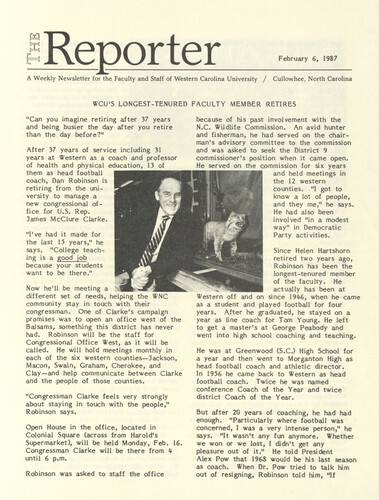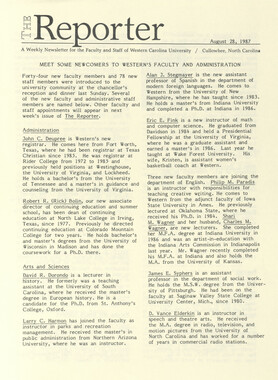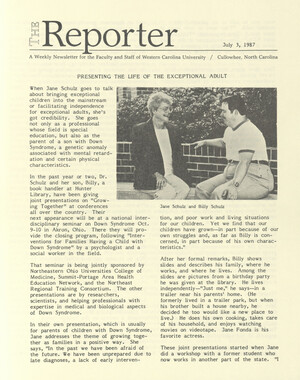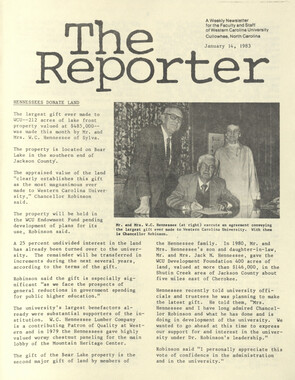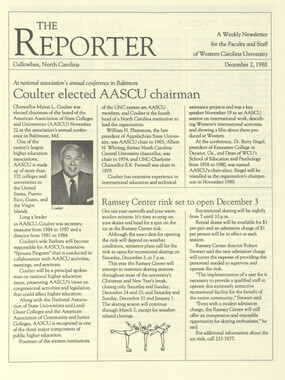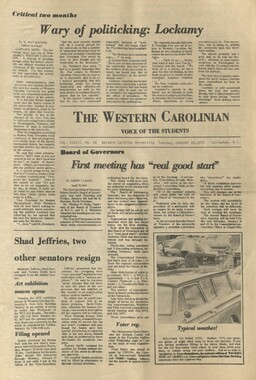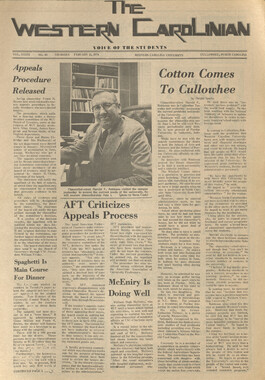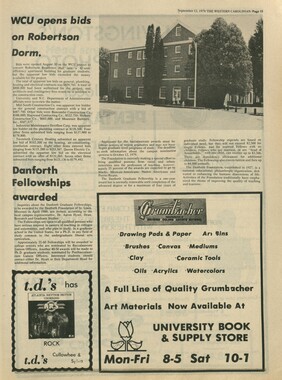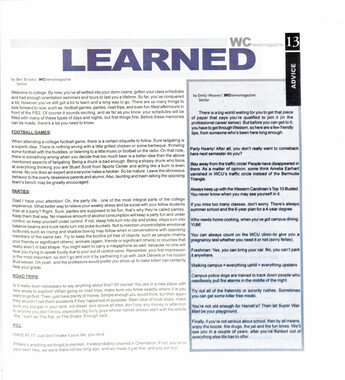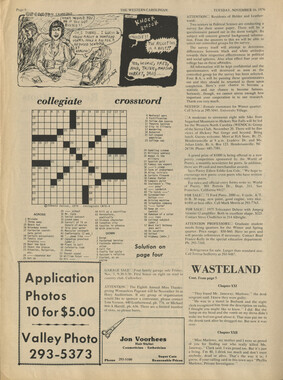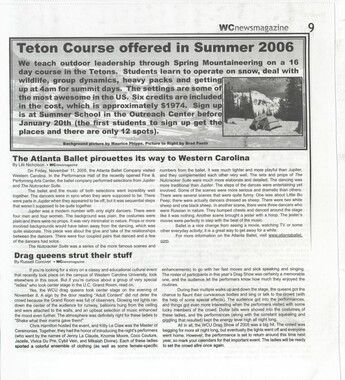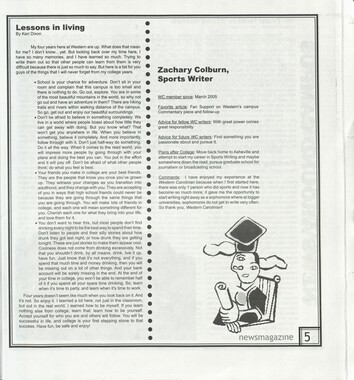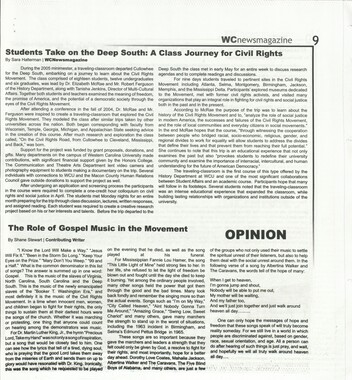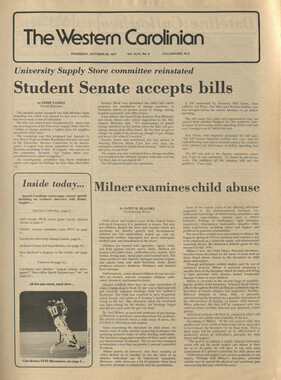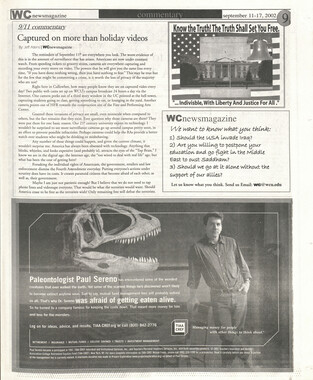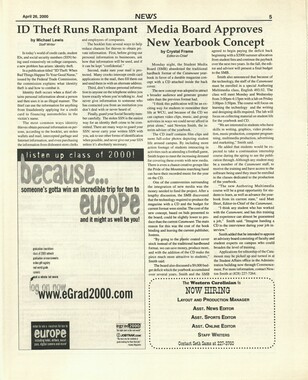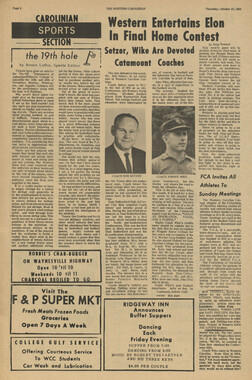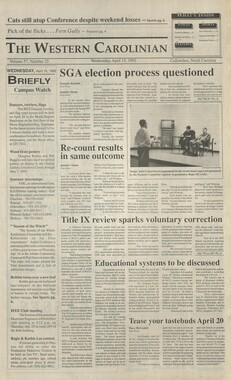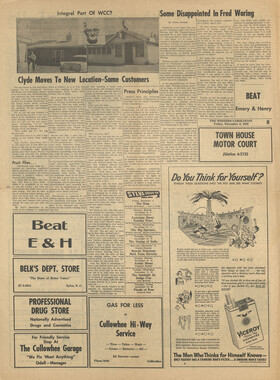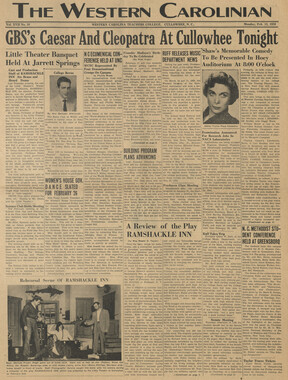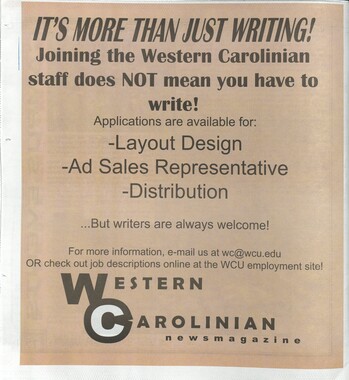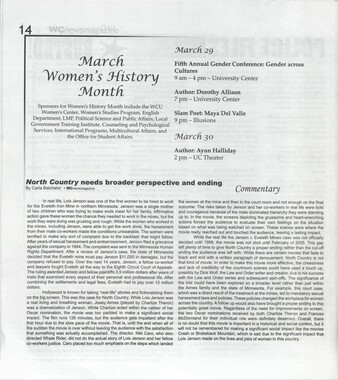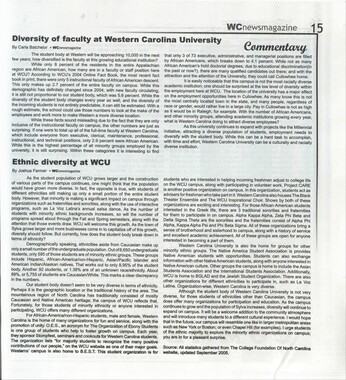Western Carolina University (20)
View all
- Canton Champion Fibre Company (2308)
- Cherokee Traditions (291)
- Civil War in Southern Appalachia (165)
- Craft Revival (1942)
- Great Smoky Mountains - A Park for America (2946)
- Highlights from Western Carolina University (430)
- Horace Kephart (941)
- Journeys Through Jackson (159)
- LGBTQIA+ Archive of Jackson County (85)
- Oral Histories of Western North Carolina (314)
- Picturing Appalachia (6873)
- Stories of Mountain Folk (413)
- Travel Western North Carolina (160)
- Western Carolina University Fine Art Museum Vitreograph Collection (129)
- Western Carolina University Herbarium (92)
- Western Carolina University: Making Memories (738)
- Western Carolina University Publications (2491)
- Western Carolina University Restricted Electronic Theses and Dissertations (146)
- Western North Carolina Regional Maps (71)
- World War II in Southern Appalachia (131)
University of North Carolina Asheville (6)
View all
- Allanstand Cottage Industries (62)
- Appalachian National Park Association (53)
- Bennett, Kelly, 1890-1974 (1463)
- Berry, Walter (76)
- Brasstown Carvers (40)
- Carver, George Washington, 1864?-1943 (26)
- Cathey, Joseph, 1803-1874 (1)
- Champion Fibre Company (233)
- Champion Paper and Fibre Company (297)
- Cherokee Indian Fair Association (16)
- Cherokee Language Program (22)
- Crowe, Amanda (40)
- Edmonston, Thomas Benton, 1842-1907 (7)
- Ensley, A. L. (Abraham Lincoln), 1865-1948 (275)
- Fromer, Irving Rhodes, 1913-1994 (70)
- George Butz (BFS 1907) (46)
- Goodrich, Frances Louisa (120)
- Grant, George Alexander, 1891-1964 (96)
- Heard, Marian Gladys (60)
- Kephart, Calvin, 1883-1969 (15)
- Kephart, Horace, 1862-1931 (313)
- Kephart, Laura, 1862-1954 (39)
- Laney, Gideon Thomas, 1889-1976 (439)
- Masa, George, 1881-1933 (61)
- McElhinney, William Julian, 1896-1953 (44)
- Niggli, Josephina, 1910-1983 (10)
- North Carolina Park Commission (105)
- Osborne, Kezia Stradley (9)
- Owens, Samuel Robert, 1918-1995 (11)
- Penland Weavers and Potters (36)
- Roberts, Vivienne (15)
- Roth, Albert, 1890-1974 (142)
- Schenck, Carl Alwin, 1868-1955 (1)
- Sherrill's Photography Studio (2565)
- Southern Highland Handicraft Guild (127)
- Southern Highlanders, Inc. (71)
- Stalcup, Jesse Bryson (46)
- Stearns, I. K. (213)
- Thompson, James Edward, 1880-1976 (226)
- United States. Indian Arts and Crafts Board (130)
- USFS (683)
- Vance, Zebulon Baird, 1830-1894 (1)
- Weaver, Zebulon, 1872-1948 (58)
- Western Carolina College (230)
- Western Carolina Teachers College (282)
- Western Carolina University (2008)
- Western Carolina University. Mountain Heritage Center (18)
- Whitman, Walt, 1819-1892 (10)
- Wilburn, Hiram Coleman, 1880-1967 (73)
- Williams, Isadora (3)
- Cain, Doreyl Ammons (0)
- Crittenden, Lorraine (0)
- Rhodes, Judy (0)
- Smith, Edward Clark (0)
- Appalachian Region, Southern (2693)
- Asheville (N.C.) (1936)
- Avery County (N.C.) (26)
- Blount County (Tenn.) (195)
- Buncombe County (N.C.) (1672)
- Cherokee County (N.C.) (283)
- Clay County (N.C.) (556)
- Graham County (N.C.) (236)
- Great Smoky Mountains National Park (N.C. and Tenn.) (519)
- Haywood County (N.C.) (3569)
- Henderson County (N.C.) (70)
- Jackson County (N.C.) (4913)
- Knox County (Tenn.) (35)
- Knoxville (Tenn.) (13)
- Lake Santeetlah (N.C.) (10)
- Macon County (N.C.) (420)
- Madison County (N.C.) (215)
- McDowell County (N.C.) (39)
- Mitchell County (N.C.) (132)
- Polk County (N.C.) (35)
- Qualla Boundary (982)
- Rutherford County (N.C.) (76)
- Swain County (N.C.) (2182)
- Transylvania County (N.C.) (270)
- Watauga County (N.C.) (12)
- Waynesville (N.C.) (86)
- Yancey County (N.C.) (72)
- Aerial Photographs (3)
- Aerial Views (60)
- Albums (books) (4)
- Articles (1)
- Artifacts (object Genre) (228)
- Bibliographies (1)
- Biography (general Genre) (2)
- Cards (information Artifacts) (38)
- Clippings (information Artifacts) (191)
- Copybooks (instructional Materials) (3)
- Crafts (art Genres) (622)
- Depictions (visual Works) (21)
- Design Drawings (1)
- Drawings (visual Works) (185)
- Envelopes (73)
- Exhibitions (events) (1)
- Facsimiles (reproductions) (1)
- Fiction (general Genre) (4)
- Financial Records (12)
- Fliers (printed Matter) (67)
- Glass Plate Negatives (381)
- Guidebooks (2)
- Internegatives (10)
- Interviews (815)
- Land Surveys (102)
- Letters (correspondence) (1013)
- Manuscripts (documents) (618)
- Maps (documents) (177)
- Memorandums (25)
- Minutes (administrative Records) (59)
- Negatives (photographs) (6090)
- Newsletters (1290)
- Newspapers (2)
- Notebooks (8)
- Occupation Currency (1)
- Paintings (visual Works) (1)
- Pen And Ink Drawings (1)
- Periodicals (193)
- Personal Narratives (10)
- Photographs (12976)
- Plans (maps) (1)
- Poetry (5)
- Portraits (4568)
- Postcards (329)
- Programs (documents) (181)
- Publications (documents) (2443)
- Questionnaires (65)
- Relief Prints (26)
- Sayings (literary Genre) (1)
- Scrapbooks (282)
- Sheet Music (2)
- Slides (photographs) (402)
- Songs (musical Compositions) (2)
- Sound Recordings (796)
- Specimens (92)
- Speeches (documents) (18)
- Tintypes (photographs) (8)
- Transcripts (322)
- Video Recordings (physical Artifacts) (23)
- Text Messages (0)
- A.L. Ensley Collection (275)
- Appalachian Industrial School Records (7)
- Appalachian National Park Association Records (336)
- Axley-Meroney Collection (2)
- Bayard Wootten Photograph Collection (20)
- Bethel Rural Community Organization Collection (7)
- Blumer Collection (5)
- C.W. Slagle Collection (20)
- Canton Area Historical Museum (2110)
- Carlos C. Campbell Collection (462)
- Cataloochee History Project (64)
- Cherokee Studies Collection (4)
- Daisy Dame Photograph Album (5)
- Daniel Boone VI Collection (1)
- Doris Ulmann Photograph Collection (112)
- Elizabeth H. Lasley Collection (1)
- Elizabeth Woolworth Szold Fleharty Collection (4)
- Frank Fry Collection (95)
- George Masa Collection (173)
- Gideon Laney Collection (452)
- Hazel Scarborough Collection (2)
- Hiram C. Wilburn Papers (28)
- Historic Photographs Collection (236)
- Horace Kephart Collection (861)
- Humbard Collection (33)
- Hunter and Weaver Families Collection (1)
- I. D. Blumenthal Collection (4)
- Isadora Williams Collection (4)
- Jesse Bryson Stalcup Collection (47)
- Jim Thompson Collection (224)
- John B. Battle Collection (7)
- John C. Campbell Folk School Records (80)
- John Parris Collection (6)
- Judaculla Rock project (2)
- Kelly Bennett Collection (1482)
- Love Family Papers (11)
- Major Wiley Parris Civil War Letters (3)
- Map Collection (12)
- McFee-Misemer Civil War Letters (34)
- Mountain Heritage Center Collection (4)
- Norburn - Robertson - Thomson Families Collection (44)
- Pauline Hood Collection (7)
- Pre-Guild Collection (2)
- Qualla Arts and Crafts Mutual Collection (12)
- R.A. Romanes Collection (681)
- Rosser H. Taylor Collection (1)
- Samuel Robert Owens Collection (94)
- Sara Madison Collection (144)
- Sherrill Studio Photo Collection (2558)
- Smoky Mountains Hiking Club Collection (616)
- Stories of Mountain Folk - Radio Programs (374)
- The Reporter, Western Carolina University (510)
- Venoy and Elizabeth Reed Collection (16)
- WCU Gender and Sexuality Oral History Project (32)
- WCU Mountain Heritage Center Oral Histories (25)
- WCU Oral History Collection - Mountain People, Mountain Lives (71)
- WCU Students Newspapers Collection (1923)
- Western North Carolina Tomorrow Black Oral History Project (69)
- William Williams Stringfield Collection (2)
- Zebulon Weaver Collection (109)
- African Americans (390)
- Appalachian Trail (35)
- Artisans (521)
- Cherokee art (84)
- Cherokee artists -- North Carolina (10)
- Cherokee language (21)
- Cherokee pottery (101)
- Cherokee women (208)
- Church buildings (190)
- Civilian Conservation Corps (U.S.) (111)
- College student newspapers and periodicals (2012)
- Dams (107)
- Dance (1023)
- Education (222)
- Floods (61)
- Folk music (1015)
- Forced removal, 1813-1903 (2)
- Forest conservation (220)
- Forests and forestry (1195)
- Gender nonconformity (4)
- Great Smoky Mountains National Park (N.C. and Tenn.) (181)
- Hunting (45)
- Landscape photography (25)
- Logging (119)
- Maps (83)
- Mines and mineral resources (8)
- North Carolina -- Maps (18)
- Paper industry (38)
- Postcards (255)
- Pottery (135)
- Railroad trains (72)
- Rural electrification -- North Carolina, Western (3)
- School integration -- Southern States (2)
- Segregation -- North Carolina, Western (5)
- Slavery (5)
- Sports (452)
- Storytelling (243)
- Waterfalls -- Great Smoky Mountains (N.C. and Tenn.) (66)
- Weaving -- Appalachian Region, Southern (280)
- Wood-carving -- Appalachian Region, Southern (328)
- World War, 1939-1945 (173)
The Reporter, February 1987
-
The Reporter is a publication produced by Western Carolina University featuring news, events, and campus community updates for faculty and staff. The publication began in August of 1970 and continues digitally today. Click on the link in the “Related Mate
-
-
m E=J Reporter February 6, 1987 A Weekly Newsletter for the Faculty and Staff of Western Carolina University / Cullowhee, North Carolina WCU'S LONGEST-TENURED FACULTY MEMBER RETIRES "Can you imagine retiring after 37 years and being busier the day after you retire than the day before?" After 37 years of service including 31 years at Western as a coach and professor of health and physical education, 13 of them as head football coach, Dan Robinson is retiring from the university to manage a new congressional office for U.S. Rep. James McClure Clarke. "I've had it made for the last 15 years," he says. "College teaching is a good job because your students want to be there." Now he'll be meeting a different set of needs, helping the WNC community stay in touch with their congressman. One of Clarke's campaign promises was to open an office west of the Balsams, something this district has never had. Robinson will be the staff for Congressional Office West, as it will be called. He will hold meetings monthly in each of the six western counties—Jackson, Macon, Swain, Graham, Cherokee, and Clay—and help communicate between Clarke and the people of those counties. "Congressman Clarke feels very strongly about staying in touch with the people," Robinson says. Open House in the office, located in Colonial Square (across from Harold's Supermarket), will be held Monday, Feb. 16. Congressman Clarke will be there from 4 until 6 p.m. Robinson was asked to staff the office because of his past involvement with the N.C. Wildlife Commission. An avid hunter and fisherman, he had served on the chairman's advisory committee to the commission and was asked to seek the District 9 commissioner's position when it came open. He served on the commission for six years and held meetings in the 12 western counties. "I got to know a lot of people, and they me," he says. He had also been involved "in a modest way" in Democratic Party activities. Since Helen Hartshorn retired two years ago, Robinson has been the longest-tenured member of the faculty. He actually has been at Western off and on since 1946, when he came as a student and played football for four years. After he graduated, he stayed on a year as line coach for Tom Young. He left to get a master's at George Peabody and went into high school coaching and teaching. He was at Greenwood (S.C.) High School for a year and then went to Morganton High as head football coach and athletic director. In 1956 he came back to Western as head football coach. Twice he was named conference Coach of the Year and twice district Coach of the Year. But after 20 years of coaching, he had had enough. "Particularly where football was concerned, 1 was a very intense person," he says. "It wasn't any fun anymore. Whether we won or we lost, I didn't get any pleasure out of it." He told President Alex Pow that 1968 would be his last season as coach. When Dr. Pow tried to talk him out of resigning, Robinson told him, "If Notre Dame called me today, I'd tell them I Chuck Taylor, and students Sally Alewel, didn't intend to coach." Richard Bovender, and Cliff Clark. Although he had tenure and taught half time in the health and physical education area, Robinson says, "I didn't feel they had an obligation to me, because they brought me here as a coach. But Dr. Pow was gracious enough to offer me a faculty position." One of the first tasks he was assigned as a full-time member of the faculty was to supervise student teachers at the pool. That evolved into a full-time summer job at the pool and the summer swimming program, which grew into the full-scale summer recreation program as it is today. Robinson remained responsible for the swimming program, while Sue Persons took over the other summer activities. "We tried to have a top-notch program. If a kid got a card at the end, he really qualified for it," Robinson says. "The demand always exceeded the capacity. We had about all we could say grace over." —Elizabeth Addison CENTENNIAL COMMITTEE GATHERS IDEAS The committee in charge of coordinating plans for Western's Centennial Celebration from August 1989 through the summer of 1990 invites proposals for events and activities to be included in the celebration. Individuals, organizations, and committees can make proposals in writing to William 3. Kirwan, chairman of the Centennial committee, Hunter Library between now and April 15. Each suggestion should be accompanied by a name, an address, and a telephone number. The Centennial committee, appointed by the chancellor, represents all of the university community. Serving on the committee, headed by Kirwan, are Mrs. Frank H. Brown, Jr., Reg Moody, Jack Hennessee, Orville Coward, Charles McConnell (president of the WCU Alumni Association), Deb Babel, Royce Woosley, Joe Beck, Max Williams, Joan Byrd, Tyler Blethen, Taylor Huskins, James Dooley, Judy Dowell, J.C. Alexander, Doug Reed, Jack Barnett, C.J. Carter, Judy Stillion, Glenn Stillion, Guy Burchfiel, Hanson Smith, Harry Ramsey, Ken Wood, NCCAT POSITIONS OPEN The North Carolina Center for the Advancement of Teaching, a year-round residential center designed to promote the intellectual growth of outstanding North Carolina teachers, is advertising two positions, one for a Center Fellow and one for a Coordinator of Information Services. The NCCAT is, like Western, an affirmative action/equal opportunity employer and a constituent of The University of North Carolina. As a member of the NCCAT residential faculty, the Center Fellow will join others in planning and conducting seminars on interdisciplinary topics for K-12 teachers, serve as a mentor for independent study projects that are undertaken by teacher-participants, participate in NCCAT research and outreach activities, and work closely with and advise the Director and Associate Director. An applicant should possess a terminal degree in his or her discipline and have an established reputation as teacher and scholar. He or she should have a strong commitment to interdisciplinary teaching and an academic background that reflects diverse exposure to the arts, humanities, and sciences. Experience in designing and conducting programs for elementary and secondary school teachers is desirable. Salary for this position will be commensurate with qualifications and experience, up to a maximum of $40,000 for a 12-month contract. Appointment will begin July 1. Send letter of application, resume, and the names and addresses of three references no later than March 1 to: R. Bruce McPherson, Director N.C. Center for the Advancement of Teaching Western Carolina University Cullowhee, N.C. 28723 The Coordinator of Information Services (Information and Communications Specialist III, Grade 72) will be responsible for all public information and public relations related to the Center. The job entails preparation and distribution of news releases to print media at local, state, and national levels; preparation and distribution of feature stories; preparation and distribution of news material to radio anc television stations; preparation of brochures and other promotional material; supervision of development of slide/tape shows and video for promotional and recruiting purposes; development ant implementation of long-range communications plan for radio, TV, and print media; coordination of alumni newsletter; and related duties. The person will work in col- The new Western North Carolina Regional Cardiac Rehabilitation and laboration with the Office of Intervention Program linking WCU and C.J. Harris Community Hospital Public Information at Western was established Thursday, Jan. 29, at a signing ceremony in Cullowhee. Carolina University. A mini- Chartering *he °ew program were, from left, William Aldis, Sylva physician mum of five vears' exnerienr«> a? ^C, ., °f.the med|cal staff at CJ. Harris; Donald C. Morgan, president . , , P C.J. Harris; Art Pilch, professor of health, physical education, and in print or broadcast jour- recreation at Western; and Chancellor Myron L. Coulter. Dr. Aldis is the nalism, with working knowl- medical director for the new program and Pilch will be co-director, edge of public relations, is preferred. Educational requirements: minimum of B.A. in journalism, with master's preferred. The job begins April 1. Salary range (hiring rate $23,592): $23,592-$38,004. Qualified candidates must submit an application, curriculum vitae, three letters of recommendation, and sample of work by March 1 to Judy Smoker in the WCU Personnel Office. NEWS BRIEFS Auditions - Speech and Theatre Arts will conduct auditions for its 1987 One-Act Festival Monday, Feb. 9, from 6 until 6:30 p.m. in Niggli Theatre. Scripts are available in 124 Stillwell. "Amicable Parting" by George Kaufman and Leueen MacGrath, "Buddies" by Mary Gallagher, and "Crosspatch" by Larry Randolph will be performed in dinner theatre March 24; "Luv" by Murray Schisgal will be performed in dinner theatre March 27; and "Make-Up Artist" by David Henry Wilson and "Cowboy Mouth" by Sam Shephard and Patti Smith will be staged April 10 in Niggli. Call ext. 7491 for more information. Concert - The WCU Jazz Ensemble under the direction of Mario Gaetano will conduct its annual winter concert tour of North Carolina high schools Feb. 11-13. In recognition of Black History Month, the group will play special selections by Count Basie and Duke Ellington, among others. Youth Orchestra - The spring term for the WNC Youth Orchestra will begin Saturday, Feb. 14, with 9 a.m. auditions for new members in the band room of the Music-English Building. Regular rehearsals will be from 10 a.m. until noon each Saturday through April 11. The orchestra, conducted by William Henigbaum and Stephen Lawson of the WCU music faculty, is sponsored by the Jackson County Arts Council in cooperation with the music department and area music educators. It is supported by grants and private donors. For further information or to make contributions, contact Eva Adcock at ext. 7242. Art - Photographer Baldwin S. Lee will exhibit his work and give lectures on photography beginning Monday, Feb. 9. His recent photographs of the South will be shown Feb. 9 through March 4 in the art gallery of Belk Building. An opening reception for the exhibit will be held at 7:30 p.m. Feb. 9 in the gallery, following his 7 p.m. lecture on the exhibit in 104 Belk. On Tuesday, he will lecture in 104 Belk on his former teacher, Walker Evans. Lee's work has been exhibited nationally and is in the permanent collections of the Museum of Modern Art, Yale University Art Gallery, and the University of Kentucky Art Museum. An illustrated catalog is available on request. Groups - Several "Groups for Growth and Change" are being offered by the Counseling, Testing, and Psychological Services Center this semester. Don't delay—they start this week. They are open to all students, staff, and faculty. To find out times and to register, call ext. 7469. Participation in any group is confidential; faculty and staff are encouraged to refer students and to attend themselves. Topics this term: Creative Relaxation, Assertive-ness Training, Developing Healthy Relationships, Psychotherapy, Confronting the Alcoholic System, Self-Defeating Behaviors, Focus on Food, Problems with Eating: A Support Group, Dreamwork, Self-Enhancement, Invisible Physical Challenges, Personal Growth through Games, Men's Group, Why Me?, Sexual Assault Support Group, and Women in Relationships. Computer Workshops - The Computer Center is offering two workshops next week. To register, call ext. 7282. On Tuesday or Wednesday, Feb. 10 or 11, learn the use of the VAX text editor (EDT) in creation and modification of data files, text files, and program source code. On Thursday or Friday learn the basic techniques in using the Digital Standard RUNOFF report generator on the VAX. All workshops are scheduled from 3 until 5 p.m. IET Grant - Western's department of industrial education and technology received a $6,000 grant from the Society of Plastics Engineers, Carolinas-Virginia section, toward the purchase of a plastics injection machine for lab instruction. The German-made Arburg machine has been operational in the industrial education and technology department since October. It accompanies a similar computerized plastics injection machine which the department purchased three years ago, also with matching funds from the Society of Plastics Engineers. Spring in England - Plans are under way for the annual Spring in England tour to London and surrounding areas, tentatively scheduled May 11 through June 1. The tour will be led this year by Don Loeffler of Speech and Theatre Arts and Jeff Neff, geography professor. All interested persons are eligible to go, and academic credit is available for geography and theatre courses. The estimated cost is $1,300, including transportation, accommodations, tickets to several theatre events, some side trips from London, visits to museums, and other places. For more information, contact Dr. Loeffler at ext. 7491. Foreigner Benefit - The rehearsal grapevine report is that it's getting funnier and funnier. Whether or not you missed the highly acclaimed performances of The Foreigner last November, you'll want to come again Feb. 14 when the cast and crew stage a benefit performance preparatory to taking the production to regional competition in Knoxville. Tickets are $10, and curtain is at 7:30. Western's production was one of six chosen from more than 70 in the Southeast for "high standards of excellence" by the selection committee of the John F. Kennedy Center's 19th American College Theatre Festival. A recommendation in Knoxville will mean the entire cast, crew, and set will travel to the nation's capital in March to perform at the Kennedy Center. REACH Benefit - St. Valentine's Day is also the day for a dance to raise funds for REACH, Jackson County's program for victims of sexual abuse and domestic violence. The dance will be held from 9 p.m. until 1 a.m. with music by "Wishful Thinking," a band from Brevard which plays a mixture of classic rock and roll, top 40, and beach music. Set-ups and soft drinks will be available, and a number of door prizes, including a $400. VCR, will be given away. Tickets are $15 each or $30 per couple. If you would like to contribute $5, $10, or $15 rather than attend, your name can be entered for a door prize. Make reservations by calling the REACH office at 586-8969. I Reporter A Weekly Newsletter for the Faculty and Staff of Western Carolina University February 13, 1987 / Cullowhee, North Carolina CULTIVATING BEAUTIFUL SONG Forget any stereotyped ideas you may have of an opera singer. Laura Mann doesn't fit them. Nothing rotund, nothing somber about this woman. Aerobic exercise, jazz dancing, proper diet, an interest in mankind and world peace, serenity and beauty—these are some of the things of importance to Mann, visiting assistant professor of voice at Western. "I can sing any kind of rehearsal just on yogurt and a piece of fruit," Mann said, "but I eat a lot of red meat if I have a performance coming up. "There seems to be a belief about adrenalin when you stand on stage," she said. "You have to channel whatever energy you have; having beef or liver helps to give more energy and more stability." Laura Mann needs a lot of energy to maintain her busy schedule of teaching and performing. Over the past Christmas season, she performed two concerts in Buffalo, N.Y., which featured music for soprano, strings, and harp. Forthcoming are performances as guest recitalist at the Chopin Society at Mid-America Recital Series in Edmond, Okla., during February and as guest artist in April at Principia College in the St. Louis, Mo., area. She also will present a master class and lecture on voice there. And she will be making her Asheville debut March 15. She will present a recital with pianist John Ferguson, visiting artist at Asheville-Buncombe Technical College, at 3 p.m. in Lord Auditorium at Pack Memorial Library. "I've been singing since a child," Mann said. "I made my first appearance when I was five, and I did my first professional show at nine in Niagara Falls, Ont., with a summer theatre. I have always enjoyed being in front of people on stage and singing. "When I was small I used to keep myself awake so I could listen to my mother sing lullabies. She was Lithuanian. I used to memorize the words and that was how I learned my first song." Laura Mann's musical talent was recognized and encouraged and early led to full-tuition scholarships at the Eastman School of Music in Rochester, N.Y., for both Bachelor of Music and Master of Music degrees. This was followed by studies at the Hochschule fur Musik in Cologne, West Germany, and at the Opera Studio in West Berlin. What is opera to Laura Mann? "Opera," she said, "is communicating. Communicating ideas and feelings through characters. Like everything else, some have very noble thoughts, some are just purely melodrama." But the reality is that, even though opera is a major art form, most people in this country are not interested in it. Mann described this as being caused by a lack of familiarity with opera. "Once exposed to opera," she said, "almost anyone would like it because deep within us there is something that responds to beauty. "We have to instruct people in the arts," she said. "We have to communicate better, make those forms more available to other persons, to some way strip down the barrier. The barrier is just ignorance. "Everybody responds to beauty, to a beautiful sound or a beautiful picture or to love. There are some universal things everyone responds to. People need to understand that the arts are not extra. They are vital elements of our society and should be recognized as such. North Carolina is very progressive in that area, and it's great." Her own style as a performer is that of a lyric soprano. "Lyric," she said, "is just that, a description of how the part is sung, lyrically. It is generally the heroine's part." Teaching voice is as much a part of her life as performing on stage. Prior to accepting a position at WCU, she taught at Texas Tech in Lubbock as well as other schools. Several of her students have gone on to win scholarships here and abroad. Laura Mann cares very much about that. "Something that is very important," she said, "is cultivating beautiful singing. Because that's what touches people, that's what communicates. So many of the voices today are commercial, they are simply not beautiful." The problem is time. Without strong support, opera singers are not able to obtain enough experience to develop properly, according to Mann. Many are forced to end their careers when they should be in mid-career, she said. "There's a lot of mismanagement of voice teaching, too," she said. "People don't take enough time to learn. We are a very impatient society. It's not an age that gives a lot of care to things that are beautiful. We need to nurture singers. Any kind of singer. "This is probably the bottom line. Singers need nurturing and they are not getting that. It is bad for everybody. We have to get back to cultivating the beauty of sound that was once prevalent in singing. "When you are on stage just to perform," she said, "it gets to be introverted after a while. I got into teaching because I wanted to communicate what I know to somebody else. I saw my own mistakes. I wanted to share that with students, and it's very exciting for me to do that, to see things click in the student's mind. "I believe there is an order to everything," she said, "and the sooner we get in touch with it, the better. I don't think things are happenstance. I didn't give myself my voice—no singer did. A person who has an ability has that ability from God. We need to let go and do as much as we can to cultivate what we have." Mann has appeared as a leading lyric soprano in Germany, Austria, Switzerland, and Poland, and has traveled and performed widely in the U.S. — Nils Hardin (Used by permission from the Asheville Citizen-Times, "Smoky Mountain Neighbors," Feb. 4/5, 1987) DEVELOPMENT AIM OF CHINA VISIT Western's Center for Improving Mountain Living may have a counterpart in the People's Republic of China. Chancellor Myron L. Coulter and International Instructional Programs Director Ellerd Hulbert left Monday, Feb. 2, on a 16-day trip to Thailand and China to assist in establishing an economic development center for Yunnan Province on the Yunnan University campus, similar to Western's CIML. The WCU officials will spend a week in Kunming, the capital of Yunnan Province and home of Yunnan University, with which Western has had educational and economic exchanges since 1981. "Yunnan University has not been active in the economic development of the province in the same way that the Center for Improving Mountain Living has been active in our region," Dr. Coulter said. "The people are interested in doing that, and we'll see if there are ways we can help the university set up an economic development center, using our Center for Improving Mountain Living as a model." Coulter and Hulbert, with Wayne Cooper of Arcon Manufacturing, Inc., of Charlotte, also will pursue specific business arrangements between North Carolina and Yunnan Province that were initiated by the Chinese last fall. The province would like to develop business ties in the form of direct import/export of goods and equipment, joint ventures and investments, and tourism development, Chinese officials have said. Coulter and Hulbert plan to stop in Hong Kong and Guangzhou (formerly Canton), capital of Guangdong Province, which borders Hong Kong, to discuss business and tourism development possibilities for North Carolina companies. They will meet with Yang Xing Po, head of agribusiness for the province and father of WCU graduate student Yang Xiao Yan, and travel to Haikou on Hainan Island, which the Chinese government recently opened to foreigners and wants to develop into a tropical resort, Hulbert said. In Bangkok and Chiang Mai, Thailand, WCU and government officials will examine the next step in a joint project toward converting Thailand's 36 teachers' colleges to four-year comprehensive institutions. The Thai government plans to bring 800 faculty members to the doctoral level and another 1,000 to the master's level, targeting industrial technology, industrial education, tourism, and special education first. Western so far has assisted the Thailand Ministry of Education in seeking funding for the faculty training and advanced degree work. Last August Western organized and sponsored the first of three seminar/internship programs in administration, management, and program and staff development, held at WCU for the Thai teachers' college presidents. While in Thailand, Coulter and Hulbert will visit one of the water harvesting projects administered by WCU's Center for Improving Mountain Living. Water harvesting is the collection and storing of rainfall runoff in ponds to make water available for household use, stock watering, and irrigation; the ponds also are used to raise fish. The project Hulbert and Coulter will visit, the Center for the Uplift of the Hill Tribes, is located in northwestern Thailand. The N.C. Center for the Advancement of Teaching recently received a collection of approximately 70 works of art as a donation from North Carolina-based NCNB. The art, all by North Carolina artists, is on display in Madison Hall, the Center's interim headquarters. Shown with one of the paintings are, left to right, R. Bruce McPherson, NCCAT director; Jerry L. Cole of Asheville, senior vice-president of NCNB; and Emma Bass, a first-grade school teacher from Durham. NEWS BRIEFS Poetry - Robert Morgan, a native of Zirconia in Henderson County and now a writer and professor at Cornell University, will be reading from his poetry this Friday, Feb. 13, at 7:30 p.m. His latest book is entitled Groundwork. The reading at City Lights in downtown Sylva is sponsored jointly by City Lights and the Jackson County Arts Council. Faculty Recital - On Monday, Feb. 16, the WCU Faculty Recital Series will present Robert Holquist, bass-baritone. Henry V. Lofquist will be the accompanist. The free concert will begin at 8 p.m. in the Music-English Recital Hall. He will sing selections in English, German, French, and Italian from various periods, including several lighter works. Art - "Ceramic Wallpieces," an exhibition of works by Kathy Triplett, are on display through March 5 in Chelsea Gallery. "My recent ceramic wall pieces reflect an interest in the process and motifs of Oriental rug design, where pattern provides an unlimited horizon for the imagination," she says. "My pattern iconography makes reference also to electronic graphics, the human figure as interpreted by preliterate cultures, the insect world, and the physical exploration of outer space." Teaching Opportunity - Do you have an idea for an exciting new course? Or perhaps you would enjoy sharing your expertise with other adults who give a refreshing perspective to the classroom. Continuing Education is expanding its non-credit offerings to include a summer schedule. If you are interested in teaching a course this summer, contact Kathy Roten at ext. 7397 or 7391. Salary negotiable. Valentine Benefits - Have a good time and help somebody out with your Valentine's Day celebration. You can help send the cast and crew of a hilarious, top-notch play to regional competition in Knoxville by coming to the benefit performance at 7:30 p.m. Tickets are $10. A favorable nod in Knoxville will send The Foreigner to the Kennedy Center in March. You also can help support counseling and other services to the victims of sexual abuse and domestic violence in Jackson County by attending the second annual St. Valentine's Ball sponsored by REACH. "Wishful Thinking" from Brevard will provide dance music in the Community Services Building from 9 until 1. Tickets are $15 or $30 per couple, and door prizes will be given away. A photographer will be there to take your picture with your date. Call ext. 7491 for theatre reservations, 586-8969 for the dance. Western on the News - Tune in to "First News" at 5:30 on WLOS-TV Monday night to see director Steve Ayers and Mark Warwick, who plays "the foreigner." They'll show a short video from the play, too. Presentations Wanted - The Appalachian Consortium, The River Foundation, and the Blue Ridge Parkway have issued an invitation for Abstracts of Presentations to examine the past, present, and future of parkways in America and around the world. The conference will be held Sept. 9-10, 1987, in Roanoke, Va. Papers, panel discussions, films, videotapes, slide-tape programs, photographic exhibits, reports of research in progress, and artistic interpretations all are welcome. Topics may include landscape architecture, economic development, law and ethics, environment, history, engineering, planning and design, recreation, management, values, travel and tourism, land, literature, the future, art and photography, and others. Abstracts must be a one-page narrative description of the presentation, double-spaced. Include title, presenter's name, institution, address, telephone number. Send to Dr. Barry M. Buxton, Appalachian Consortium, ASU/University Hall, Boone, N.C. 28608 before March 27. Computer Workshops - The Computer Center is offering two workshops next week. To register, call ext. 7282. On Tuesday or Wednesday, Feb. 17 or 18, discuss our link to the state computer network, LINC NET. On Thursday or Friday, Feb. 19 or 20, learn the basic commands of the powerful 20/20 Spreadsheet (VAX). All workshops are scheduled from 3 until 5 p.m. Shakespeare with a Twist - The Acting Company from the Kennedy Center will bring one of Shakespeare's wittiest comedies to the Ramsey Center stage Wednesday, Feb. 18, at 8 p.m. Director Gerald Gutierrez has placed Much Ado About Nothing in the chic and steamy Cuba of the 1930s, complete with tangos and Latin rhythms. The play includes three complicated plots, compromised honor, and one of Shakespeare's most delightful heroines, Beatrice, and her wittily resistant suitor. Its technical director is Jeff Clark, a 1978 graduate of Western, who was technical director at N.C. State before joining the Acting Company. Tickets: $10 adults, $8 senior citizens and WCU employees, $3 WCU students and youths. For advance tickets, call ext. 7722. Tax Help Available - Federal and North Carolina tax forms for the 1986 tax year are available at the reference desk in Hunter Library. Federal forms 1040, 1040A, 1040EZ, and Schedules A, B, and W are free to anyone who needs them; selected other forms may be photocopied. N.C. forms D-400 and D-442 and Schedules A, B, and C are also at the reference desk. Hunter keeps a collection of tax guides also. These include Prentice-Hall and IRS publications, J.K. Lasser's Your Income Tax, and Tax Guide for College Teachers. W H Reporter February 20, 1987 A Weekly Newsletter for the Faculty and Staff of Western Carolina University / Cullowhee, North Carolina SCHOLARSHIP IN TEACHING, RESEARCH, SERVICE - SORTING THE PUZZLE A month ago more than ten percent of Western's faculty gathered to sort through issues of scholarship, the basis of university life, and how it is manifested in the three activities of faculty members—their teaching, their research, and their service. A week or so later, the Association of American Colleges met in Washington and many of the same issues were discussed. According to The Chronicle of Higher Education (Jan. 28), "participants showed up in force to talk about ... teaching strategies that grow directly out of exploration at the 'frontiers of knowledge.'" Several speakers in Washington urged the involvement of undergraduates in faculty research, and others discussed the ways the curriculum or the canon in fields such as literature and history would change as new research, especially on women and minorities, was applied in the classroom. Speakers reaffirmed the teacher-scholar model, but argued that it should include scholarship that doesn't end up in print. "For instance, they should try to distinguish between professors who don't publish because they're lazy and those whose scholarship shows up in inspired and creative teaching," the Chronicle said. At Western, the context for discussion was set by presentations that reviewed four distinct processes the university has been involved in over the past year. Doug Reed spoke as chairman of the Role and Mission Committee, which, in examining the university's purpose statement and drafting a new statement of our role and mission under a directive from the chancellor, had intensive dialogue on scholarship at Western. He said his committee had concluded that scholarship was "the star by which the University should be steered." Michael Dougherty, chairman of the chancellor's Task Force on Teaching Effectiveness and Faculty Development, addressed ways in which teaching requires knowledge not only of the discipline but of teaching methods and other pedagogic concerns. He said that the teacher's attitude toward the teaching process and ability to motivate the students as well as the physical setting are also important. Bill Kane, a member of the Role and Mission Committee, spoke on Western's commitment to service and the question of what constitutes scholarly service. He pointed out that 80 percent of monies coming to the university from non-state funds are for service, not research, but it is important that our service be grounded in scholarship. We need to ask, he said, whether we may be engaging in too many activities, stretching our resources and our scholarship too thin and taking us out of our areas of expertise. Anthony Hickey, dean of research and graduate studies, summarized the work of the fall Symposium on Scholarly Productivity, redefined by the faculty members there as "research and creative activity." The idea that scholarship undergirds teaching, research, and service was affirmed by this group as well as by the Role and Mission Committee. Dr. Hickey suggested that faculty time is limited and might best be protected through personal faculty agendas, defining time commitments to the three areas for a few years at a time. He reported that, as an outgrowth of the Symposium, a Research Council had been formed. In small groups, faculty members then tackled the main questions: What is scholarship in teaching, in research, and in service? The answers were many, and the day was not long enough for a definitive consensus to emerge, but a productive dialogue took place. According to Judith Stillion, interim vice-chancellor for academic affairs, "We do have an amazing amount of consensus on campus that scholarship is what we are about. It's the one thing that unites us, the thing we rally round." Dr. Stillion says that some people feel scholarship is like a plant, its three blossoms being teaching, research, and service. Even if each blossom could be defined separately, according to this analogy, we still wouldn't know everything about the plant. But the attempt was made, and at least the dichotomies in people's minds became clearer. For scholarship in research, the polarity was particularly strong. Some felt that scholarship was a process that may or may not lead to a product; others felt the process must result in some kind of product that must be judged by peers and accepted as worthy by them. In regard to service, it was recognized that there are more needs in the community than we can meet in a scholarly way. We need to decide which are appropriate to our expertise. Should we take on fewer tasks, choosing only those we can handle with quality, or should we try to meet as many needs as possible as best we can? Everyone agreed that teaching requires scholarship in the discipline, but there was a difference of opinion about whether scholarship about teaching was also important. Many felt that knowing your discipline is not enough, but that one needs to study techniques and developmental levels in order to teach well. Others felt that you can "catch" pedagogy by observation of role models and by trial and error. Enthusiasm was a word that kept coming up—enthusiasm about the discipline, enthusiasm about the students, enthusiasm about one's role as a scholar and teacher. And whatever the disagreements, the discussion about them is lively and enlivening. Dr. Stillion says, "Professional accrediting organizations are focusing on the revitalization of faculty. This debate on scholarship on campus—not only the ferment but also the encouragement to discuss who we are and what we are about—is the beginning. This is healthy ferment and it will lead to a revitalization of Western." The faculty members gathered in January agreed that the important definitions about scholarship need to be made at the departmental level. Dr. Stillion says, "The need for consensus at the departmental level has never been greater." Other areas the group said should be explored are the implementation of faculty growth plans and ways to assess the process, not just the outcomes, of scholarship. The university will be using scholarship this spring to look at its long-range planning. Under the Long-Range Planning Committee, Western is developing a new long-range planning process. Judith Pulley, associate vice-chancellor of academic affairs and director of long-range planning at Appalachian State University, will come to explain strategic planning as implemented at ASU. She will speak to the university community March 5 at 3:30 p.m. and will work with the LRP Committee during her visit to Western. Tentatively scheduled for May is a two-day visit by George Keller, author of Academic Strategies. He would work on a model with the LRP Committee and some administrators. The Teaching Effectiveness Task Force has a number of other upcoming speakers and activities planned. Watch the Reporter March 6 for details. —Elizabeth Addison CAROL STEPHENS (Nursing), who is on leave of absence this year to pursue her Doctor of Science in Nursing degree at the University of Alabama at Birmingham, recently received a University of Alabama research fellowship for nursing—one of three awarded each year among more than 300 graduate students. At the annual meeting of the Modern Language Association in New York, NANCY JOYNER (English) was the respondent at a session entitled "Andrea Del Sarto: H86-1986." Despite the somewhat misleading title, the papers and the response dealt exclusively with Robert Browning's poem about the painter. BLANKS ENCOUNTERS REBELS Nancy Blanks' first visit to Guatemala proved a bit too exciting. Just last week, Blanks, director of water harvesting projects through the Center for Improving Mountain Living, was touring several Guatemalan sites with two evalu-ators from the Agency for International Development and two CARE Guatemala personnel, organizations that sponsor the projects. On their second day in Guatemala, they were en route to several water harvesting sites in the mountainous rain forest region near Coban-Altaverapaz. Just as their jeep reached the top of a mountain where there was a double S curve, they could see vehicles slowing down and people running along the side of the road ahead. At first, they thought it was an army roadblock. "But then we thought, 'No, they don't have uniforms,'" Blanks said. "They told us to get out of the jeep, and they wanted money, 'dinero,""she said. "They were very, very young, 12 to 16 years old, and raggedy little waifs. But their officers were not children, and they all had brand new automatic weapons." The "rebel forces," as the Guatemalan army later identified them, had commandeered a cement truck in the line of traffic ahead of Blanks' party and blocked 12 to 15 vehicles on the road. "They robbed and threatened us, told us to line up along a ditch, then they'd tell us to get back in the jeep, all with our hands over our heads. I didn't know what they were planning," Blanks said. After hours of harassment, a rebel scout thought he saw army trucks ahead, and the small band of about 15 disappeared into the rainforest as fast as they appeared. Blanks and her four companions continued on to the cooperative where 500 Guatemalan peasant families live in new housing and farm the mountainous land, with the assistance of Peace Corps and CARE workers, who organized the water haresting project. They collect rainwater runoff in ponds (water harvesting), where they grow fish and use the water to irrigate crops. The cooperative also has a dispensary and school. The group had to pass through the same area coming back. The army told them the area had been "secured," although the rebels were never found. Blanks said the rebels wanted only money— U.S. or Guatemalan currency—or boots, not jewelry or cameras. "That's fairly typical. They need money for weapons and food." Youths like those in the rebel band are illiterate and easily led by anyone who promises to feed them, she said. "You could tell they were scared and hadn't done this very often. One little boy bowed down to me and said, 'Senora,' so on the one hand he was showing subservience while he had a gun on me. Even though they were just kids, they were bullyish, and we didn't know what was going to happen," she said. They fired their guns to prove their strength with one man driving a Mercedes who resisted turning over his money. Before the trip, Blanks and her party assumed the Guatemalan government was fairly stable, she said. The two CARE workers who lived there had not experienced anything like the robbery, nor heard of such ambushes in that region of the country, although bandits are common in the country. "The only reason we had something to eat after that is they hadn't gotten all of one fellow's money," Blanks said. Even though Blanks has traveled all over the world working with the water harvesting projects in developing countries and previously as a Peace Corps administrator, she says she is never prepared for such a situation. "It's always a shock. "When you go out and work in rural areas of developing countries, where people are very poor and very unhappy, anything can happen. All of Central America is up for grabs politically," Blanks said. "The people are peasants and they are tired of the whole situation. The economy is failing in many countries. It's where the rich get richer and the poor get poorer. "But I will go back," Blanks said. "The work we do is important to rural people. It's worth the risk." —Karen Anderson WHERE ARE THE UNSUNG HEROES? February 23 is the deadline for nominations for the Paul A. Reid Distinguished Service Awards. One of these prestigious awards goes to a member of the faculty, another to a member of the administrative staff. Who deserves to be recognized in this special way for service that enhances Western's quality and reputation? Harriet Parker is chairing the selection committee; call the Registrar's Office to get guidelines for nominations. KNOW A POTENTIAL RA? If you know a mature, responsible student beyond the freshman year, that person might make a good resident assistant in one of the residence halls. A 2.0 QPR is required. The student must be interested in people and be able to plan programs. Refer such students to the Housing Office, and give them a reference if they need it. NEWS BRIEFS Women's Network - If you are interested in talking to others about issues relating to women at Western, bring your lunch on Tuesdays at noon to the Dogwood Room of the university center. If Tuesday's not a good day for you but some other day would be, let the network coordinator know. That's Darlene Franklin (ext. 7210). Computer Workshops - The Computer Center is offering three workshops next week. To register, call ext. 7282. On Tuesday, Feb. 24, learn the basic commands of the Digital Datatrieve query language in Introductory Datatrieve - DTR32 (VAX). On Wednesday, Feb. 25, an Advanced Datatrieve - DTR32 (VAX) workshop will be tailored to the experience and requests of the participants. On Thursday or Friday, Feb. 26 or 27, learn the basic techniques in using the SPSSx statistical package on the VAX. All workshops are scheduled from 2 until 5 p.m. NEW DEAN BEING SOUGHT A search committee is at work to find a new Dean of Arts and Sciences, John McCrone having left Western to take an endowed professorship at Clemson. The Dean is the chief administrative officer of the School of Arts and Sciences and reports directly to the Vice-Chancellor for Academic Affairs. The Dean is responsible for academic leadership; budget planning; recruiting, supervising, and evaluating faculty; coordinating curricula; and representing the School in the university community, state, region, and nation. Candidates must have an earned doctorate or equivalent terminal degree in one of the Arts and Sciences disciplines; a record of excellence in teaching and research or creative activities; demonstrated administrative leadership abilities; ability to work and communicate effectively with faculty members, staff, students, and other administrators; understanding of the role of public higher education; and credentials sufficient to qualify for appointment at the rank of professor. Salary is competitive and negotiable. The School of Arts and Sciences includes 160 faculty members and 14 departments which offer programs at the undergraduate and graduate levels. Letter of application, curriculum vitae, and three letters of recommendation or nomination should be sent by April 8 to: Gurney Chambers, Chairman Dean's Search Committee 221 Killian Western Carolina University Cullowhee, North Carolina 28723 Telephone (704) 227-7311 Also serving on the search committee are Dick Berne, Joan Byrd, Fred Coyle, Bill Hyatt, Mike Jones, Joe Klerlein, Jim Lewis, Dean Martin, Karl Nicholas, Anne Rogers, Kathleen Sandquist Wright, Dan Southern, Charles Stevens, Lewis Sutton, Steve Lawson, and Virginia Wittekind. Western is an affirmative action/equal opportunity employer. I Reporter A Weekly Newsletter for the Faculty and Staff of Western Carolina University February 27, 1987 / Cullowhee, North Carolina TRIO - MEETING SPECIAL NEEDS AND EDUCATIONAL CHALLENGES Sherrene was having trouble with high school freshman English, but she didn't want to let poor grades jeopardize her chances of going on to college and veterinary medicine school, a lifelong dream. Tina, who is visually impaired, decided when she was a senior at Governor Morehead School in Raleigh that she wanted to get a college degree in special education, although she didn't know whether she could obtain the campus services she would need, such as readers and notetakers. George, a good student in high school, was undecided about his future job prospects but he knew he could do more than bag groceries at a local market. All are now freshmen at Western Carolina University, where they are receiving the extra academic counseling and services they need through three federal education programs that help students overcome economic, social and cultural barriers to higher education. The Trio Programs, comprising Special Services, Upward Bound and Talent Search, operate on the WCU campus and at high schools in the seven westernmost counties of Western North Carolina and the Cherokee Indian Reservation. They are funded under the Higher Education Act of 1965. Talent Search and Upward Bound encourage low-income students to graduate from high school and to enroll in college through information, educational guidance and support. The students may need to overcome a variety of obstacles—lack of role models, or low income, or insufficient contact with guidance personnel and lack of motivation. Special Services provides handicapped, low-income and disadvantaged college students with tutors, readers, notetakers and other assistance to help them graduate. "Our purpose is to relieve the barriers to postsecondary education through tutoring, advising and counseling," said Muffie Tat urn, director of Talent Search. "You hear those three words over and over in the Trio programs." The programs are important to a rural area like Western North Carolina where the high school dropout rates tend to be high. Rural schools are often isolated and small. Some have a total enrollment of only 150 in 12 grades, and where there may be fewer guidance counselors. "Our whole purpose is academic success," said Bronwen Sheffield, director of Upward Bound, which has operated at WCU for 14 years. "Some students don't even know there's anything out there for them," Sheffield said. "We are here to tell them that there are other options, should they want to try them." Directors of the Trio Programs at WCU can reel off success stories of students who did not even know how to apply for college but who now have master's degrees and high-paying jobs. One former Upward Bound participant completed a bachelor's degree, now is a sheriff in Western North Carolina and addresses Upward Bound groups on topics of law and order. Despite the programs' successes, they are in danger of funding cuts by Congress. The Reagan administration proposes to cut Special Services and Upward Bound by half and Talent Search altogether by 1988. The Trio Programs nationwide have designated Feb. 28 as National Trio Day, when participants will campaign to keep funding intact. (Funding now approaches $180 million and reaches about 10 percent of the eligible population in the U.S., officials said.) "One argument for cutting the programs is to trim the 'fat' in the federal budget," said Diane Hoffbauer, Special Services director. "But these three programs have been very successful. They have proved themselves." Indeed, a majority of participants in Talent Search, Upward Bound and Special Services graduate from college or technical school. Last year, 71 percent of WCU's Talent Search students enrolled in college or a two-year program; 85 percent of Upward Bound students went on to college, with most graduating; and about 90 percent of Special Services students returned the next semester. This year, Talent Search at WCU involves about 900 high school students and adults; Upward Bound, about 60 ninth- through 12th-graders up to age 21; and Special Services, about 200 WCU students. Upward Bound and Talent Search complement the guidance services in the schools. "A lot of assumptions are made about students from disadvantaged backgrounds, that they are not college material, but in fact many of them have the ability to succeed in college," said Tatum of Talent Search. "These students may lack self esteem or knowledge of what courses they need for college, how to apply to colleges and what financial help is available." Upward Bound students come to WCU for six weeks each summer for rigorous academic instruction, tutoring, counseling and recreation. During the academic year, their counselors set up after-school tutoring and study halls, provide information on college and financial aid application, and test students for skill deficits. "After three years in Upward Bound, I was a lot better prepared for college," Sherrene said. "In the summers, we took college-level classes, got tutoring when we needed it and lived in campus residence halls. We learned how to live on a budget responsibly. Then when I came to Western as a freshman, I knew where things were and what to expect." Talent Search, which has operated at WCU since 1979, conducts workshops and works individually with students at high schools from Haywood County west. There may be 2 to 35 students in each workshop, which focuses on career, academic and personal development; tutoring for college entrance tests; and advising for college or technical school. The program is open to adults up to 27 years old. Nearly half of the WCU Special Services participants this year are physically or learning disabled, with the remainder qualifying because of economic status or because they are the first in their families to attend college. Some may come to the program through Talent Search or Upward Bound and continue to receive the services that streamline their college experiences. "If I hadn't been in Special Services, I probably would have dropped out, because there were so many things about college I didn't know—how to get a tutor for English and how to fill out financial aid forms with the new tax law changes," George said. "Because of the program, I haven't had any problems." Visually impaired students can arrange for notetakers in classes, readers for tests, books on tape, tutors and study skills instruction. They may also take alternate English and reading courses and obtain extra time on tests, and some have obtained magnifiers for reading notes and texts. "Last semester, I was taking a math course and Special Services arranged for me to get the tests in Braille," Tina said. "They've not only been helpful academically but I've made a lot of friends." There is great concern about equity in higher education across the country, Hoffbauer said, and the students in these programs need a lot of support and services they probably would not get otherwise. "There just are not many agencies willing to help them be successful," she said. "These programs offer opportunity where there was none. I would hate to think there might be more students here and across the country who want to go to college and have the ability to do well, but they can't get there without these programs." —Karen Anderson A retrospective exhibition of works by Diane Withrow Coyle, a graduate and former art instructor at WCU, will open Sunday, March 1, with a reception from 3 until 5 p.m. in the gallery of City Lights in downtown Sylva. Ms. Coyle, who died Sept. 28, 1986, was the wife of Frederick Coyle of the biology faculty. Dr. Coyle has established two funds in her memory in the WCU Development Foundation. One will provide a purchase award for the top drawing in the student art show each year. The drawings will form a permanent study collection in the art department. The other fund, for peace and justice, will provide for a program in the university community each year to foster international understanding. The retrospective show at City Lights will continue through the month of March. It includes works from the beginning of her graduate work in 1980 through 1983. own inner life. Ms. Coyle, who finished her B.F.A. at Western in 1974 and returned for a master's in studio art after several years in the mental health field, taught a number of courses for the art department here and at Cherokee and Haywood Tech. She worked with children in the Cullowhee Experience Prints of Diane Coyle's drawing from a sculpture of Lady Macbeth in Washington, D.C., suitable for framing, will be given to those who contribute $40 or more to either of the memorial funds in the Development Foundation. Its title is "Persistence of Memory." (Western's summer program for gifted children) and served as adviser to the Art Students League. She was very committed to efforts for world peace and emphasized expressing thoughts on war and peace when she taught collage. "She wanted to get students talking about it," Dr. Coyle says, "not brainwashing them but helping them see how art can be a means of expression." She was on the steering committee of Jackson County Citizens for a Nuclear Arms Freeze and enjoyed working with in the "Vision of Peace" contest through the public schools. She helped organize vigils for peace in Sylva and edited the group's newsletter. She worked behind the scenes with Kudzu Players and helped direct two productions. A print from one of Ms. Coyle's drawings, "Persistence of Memory," will be given to anyone who contributes $40 or more to the funds in her name. Any remaining drawings will eventually be sold to benefit the two memorial funds. Contributions may be sent to the Diane Withrow Coyle Art Fund or the Diane Withrow Coyle Peace and Justice Fund, c/o the WCU Development Foundation. MEMORIAL SHOW PLANNED NEWS BRIEFS Teaching Award Candidates Sought -Faculty members will nominate their peers for the Chancellor's Distinguished Teaching Award on Wednesday, March 4. A ballot will be in each faculty member's mailbox, and it should be returned to the departmental secretary that same day. Nominees must be in at least their third year of teaching at Western and must not have won the award within the past five years (winners during that time will be listed on the ballot for your convenience). The 1985 winner, Joe Klerlein, is chairing the selection committee. Students are nominating faculty members with forms available at the cafeterias and university center Feb. 25-March 4. One nominee will be chosen from each of the five undergraduate schools. The winner of the award, which carries $1,000 and a Patrons of Quality scholarship in the faculty member's name, will be chosen from those five and announced at the general faculty meeting in early May. Teaching as a Profession - Don Stedman, associate vice-president for academic affairs of the UNC system, will be on campus March 4 to discuss the implications of new directives from the state for the education of teachers. Among the recommendations is a requirement that all undergraduate education majors also major in a basic academic discipline and complete a core curriculum in learning theory, child development, and other subjects. Along with Willis D. Hawley, dean of Peabody College at Vanderbilt and a member of the Carnegie Task Force on Teaching as a Profession, and others, Stedman also will speak at a major invitational symposium sponsored by Western, the N.C. Center for the Advancement of Teaching, and other institutions in Asheville March 5-6. Some 100 business leaders, educators, and governmental people will be grappling with how the state may implement recommendations from the Carnegie report, A Nation Prepared, and the Holmes Group report, Tomorrow's Teachers. Science Festival - About 1,400 WNC high school students and teachers will converge on campus for the ninth annual Science Festival March 6. With a theme this year of "Wildlife—Worldwide," the keynote speaker is Dr. Thomas E. Lovejoy, executive vice-president of the World Wildlife Fund—U.S. He will speak at the 9:30 session in the Ramsey Center, with visitors welcome. Other speakers are Jesse Perry, curator of public programs at the N.C. State Museum of Natural History, and Zack Allen, director of the WNC Nature Center. Call Dick Berne for details (ext. 7260). Planning Consultant - Judith Pulley, associate vice-chancellor of academic affairs and director of long-range planning at Appalachian State University, will be here next week to discuss strategic planning as implemented at ASU. She will speak to the university community Thursday, March 5, in the Mountain Heritage Center at 3:30 p.m. She also will work with the Long-Range Planning Committee during her visit to Western. Computer Workshops - The Computer Center is offering two workshops next week. To register, call ext. 7282. On Thursday, March 5, from 2 until 5 p.m., learn the basic commands of the Digital Datatrieve query language (DTR32) for the VAX. On Friday, March 6, from 2 until 5 p.m., learn Advanced Datatrieve in a workshop tailored to participants' experience and requests. NEW W-4 FORMS COMING SOON The Tax Reform Act of 1986 requires that each employee complete a new Form W-4 (Employee Withholding Allowance) by Oct. 1, 1987. The Controller's Office is working with Central Payroll in Raleigh to coordinate the distribution of forms and instructions for preparing the W-4 form. According to Controller Chuck Wooten, "We expect to distribute the new forms to our employees during the latter part of February 1987 and to make changes effective beginning with the April payroll." Changes in the withholding allowances and rates will result in less taxes being withheld in 1987 if the taxpayer makes no changes in his/her withholding status. Beginning in 1987, a tax penalty will apply if the amount withheld during the year, plus any quarterly estimated tax payments, is not equal to at least 90 percent of your tax liability. To avoid the risks of having too little tax withheld, employees should complete the revised W-4 form early in this calendar year.
